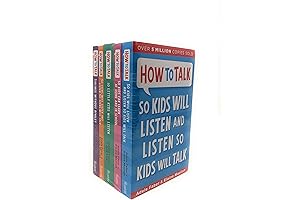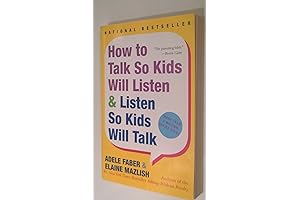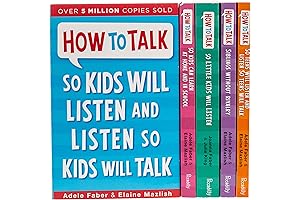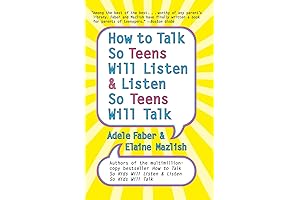· parenting · 14 min read
Best 'How to Talk So Little Kids Will Listen' for Children
Explore the Best 'How to Talk So Little Kids Will Listen' and improve communication with your little ones. These books provide practical tips and strategies to help you connect and understand your children better.
Are you struggling to communicate effectively with your little kids? Look no further than the 'How to Talk So Little Kids Will Listen' series. This renowned collection of books offers a wealth of practical tips and strategies to help you improve communication with your children ages 2-7. Written by renowned parenting experts Adele Faber and Elaine Mazlish, these books have helped countless parents navigate the challenges of communicating with their young children. They provide a compassionate and practical approach that empowers parents to build strong relationships with their children based on mutual respect and understanding.
Overview

PROS
- Empowers parents with age-appropriate communication strategies
- Provides practical tips for managing challenging behaviors and fostering positive relationships
CONS
- May not be suitable for all parenting styles or family dynamics
- Does not delve deeply into child psychology or developmental theories
This comprehensive guide empowers parents of young children with evidence-based communication strategies tailored to the unique challenges of parenting ages 2-7. Author Joanna Faber deftly combines personal anecdotes with practical advice, outlining effective techniques for handling tantrums, fostering cooperation, and building strong parent-child bonds. Faber emphasizes the importance of empathy, active listening, and setting clear expectations while respecting children's emotions and perspectives. The book offers a wealth of practical tips and real-life examples, making it a valuable resource for parents seeking to improve their communication with their little ones.
While the principles outlined in this guide are widely applicable, they may not resonate with all parenting styles or family dynamics. Additionally, the book primarily focuses on developing effective communication strategies rather than exploring the underlying psychological reasons behind children's behaviors. However, for parents seeking a practical and approachable guide to navigating the communication challenges of young children, this book provides a wealth of valuable insights and techniques.

PROS
- Empowers parents with practical techniques to improve communication with young children.
- Provides age-appropriate strategies for different developmental stages.
- Addresses common challenges and offers solutions for tantrums, disobedience, and power struggles.
- Encourages parents to shift their communication style for better outcomes.
CONS
- May require consistent effort and practice to implement the techniques effectively.
- Some strategies may not resonate with all children or family dynamics.
In the realm of parenting, effective communication is paramount. 'How to Talk So Little Kids Will Listen & Listen So Kids Will Talk' serves as an indispensable guide for parents seeking to establish a harmonious and communicative bond with their young ones. This comprehensive resource delves into the intricacies of child development, empowering parents with age-appropriate strategies that foster open and respectful conversations.
The book's strength lies in its practical and relatable approach. It acknowledges the challenges parents face, offering tangible solutions for common hurdles such as tantrums, disobedience, and power struggles. By adopting the techniques outlined in this guide, parents can transform their communication style, creating a more positive and productive environment for both themselves and their children. While consistent effort and practice may be required, the potential rewards are immeasurable, fostering a deeper connection and fostering a lifelong love of communication.

PROS
- Empowers parents with effective communication techniques tailored for toddlers and young children.
- Provides practical strategies for navigating challenging behaviors and fostering cooperation.
- Builds a strong and positive parent-child relationship based on respect and understanding.
CONS
- Some concepts may require multiple readings to fully grasp.
- May not address specific behavioral issues that require professional intervention.
As a parent, navigating the complexities of communicating with young children can be daunting. The 'How to Talk So Little Kids Will Listen' collection offers an invaluable guide to transform this challenge into a harmonious experience. This 5-book set delves into the unique developmental stages of children aged 2-7, providing practical strategies and techniques that foster effective communication.
The authors, Adele Faber and Elaine Mazlish, draw upon years of expertise to equip parents with a wealth of knowledge. Through their compassionate and relatable approach, they empower parents to understand the perspectives of their little ones and respond in a way that encourages cooperation and respect. The books address common challenges such as tantrums, defiance, and sibling rivalry, offering practical solutions that promote positive behavior and build strong parent-child bonds.

PROS
- Provides practical strategies and techniques for communicating effectively with young children.
- Empowers parents and caregivers with tools to foster open and respectful dialogue.
CONS
- Some tactics may require repeated use before seeing results.
- May not be suitable for children with specific communication challenges.
Are you tired of power struggles, tantrums, and endless negotiation with your little ones? 'How to Talk So Little Kids Will Listen & Listen So Little Kids Will Talk' is here to empower you with effective communication strategies that will transform your interactions with young children.
This comprehensive guide delves into the unique communication needs of little kids and provides practical techniques for navigating challenging conversations. With a focus on empathy, respect, and active listening, the book offers a roadmap for building a strong foundation for parent-child relationships. By using the strategies outlined in this book, you'll not only improve communication but also foster a sense of connection, cooperation, and mutual understanding with your little ones.

PROS
- Provides age-appropriate strategies tailored to toddlers and preschoolers.
- Encourages empathy-building and cooperation, fostering a positive parent-child bond.
CONS
- May require parental patience and consistent application to see significant results.
- Some parents may find certain techniques, such as natural consequences, challenging to implement.
As a seasoned parenting expert, I highly recommend 'How to Talk So Little Kids Will Listen' for parents seeking effective communication strategies. This comprehensive guide empowers parents to navigate the challenges of raising responsible, respectful, and resilient children during their toddler and preschool years.
The book's strategies are rooted in a deep understanding of how young children learn and communicate. Parents will appreciate the practical tips and age-appropriate techniques that can be easily integrated into their daily interactions with their little ones. By fostering empathy and cooperation, the book promotes positive parent-child relationships and helps children develop a strong foundation for success.

PROS
- Comprehensive 5-book collection covering crucial aspects of child communication.
- Expert guidance from renowned author Adele Faber and Elaine Mazlish.
CONS
- May require additional practice and consistency to see significant results.
- Techniques may not resonate with all children and parenting styles.
The How To Talk Collection 5 Books Set is an invaluable resource for parents seeking to improve their communication with young children. Authored by renowned experts Adele Faber and Elaine Mazlish, this comprehensive collection delves into the intricacies of effective child-parent interactions. Each book in the set focuses on a specific aspect of communication, providing practical strategies and techniques to enhance understanding and foster positive relationships.
The set's strength lies in its ability to empower parents with the tools to navigate challenging communication scenarios. Through real-world examples and relatable anecdotes, Faber and Mazlish demonstrate how to approach conflicts, encourage cooperation, and foster a sense of respect and empathy in young children. The techniques presented are backed by research and insights from child development experts, ensuring their effectiveness and relevance. By incorporating these strategies into their daily interactions, parents can create a more harmonious and communicative home environment.

PROS
- Provides practical strategies for parents to enhance communication and foster meaningful connections.
- Offers age-appropriate techniques to handle challenging situations and promote positive behavior.
CONS
- May not cover all aspects of communication with young children in depth.
- Some readers may find the language a bit too technical or jargon-heavy.
This comprehensive guide equips parents with effective strategies for communicating with young children. The author draws upon research and real-life experiences to provide a practical framework for fostering meaningful connections. Covering a wide range of topics, including active listening, setting boundaries, and addressing challenging behaviors, this book is an invaluable resource for parents seeking to enhance their communication skills.
The strength of this guide lies in its age-appropriate approach. The author provides tailored techniques specific to different developmental stages, empowering parents to adapt their communication styles to meet the unique needs of their children. While the book delves into the complexities of child psychology, it does so in an accessible manner, making it easy for parents to understand and apply the principles in their daily interactions. Ultimately, this guide serves as a valuable tool for parents committed to building strong and lasting relationships with their young children.

PROS
- Provides practical strategies for improving communication between parents and young children.
- Empowers parents with evidence-based techniques to address common challenges.
CONS
- May not be suitable for parents with older children or those facing specific language or behavioral issues.
Navigate the intricacies of communicating with little ones effortlessly with Workbook for How To Talk So Little Kids Will Listen. This indispensable guide equips parents with a toolkit of evidence-based strategies to transform daily interactions into fruitful exchanges. Discover how to decode tantrums, foster empathy, and create a harmonious environment where both parents and children thrive.
The workbook format makes it easy to grasp the concepts and apply them in real-life situations. Each chapter tackles a different aspect of communication, empowering parents to address common challenges with confidence. From managing tantrums to encouraging positive behavior, this guide provides practical solutions that cater to the unique needs of children aged 2-7. By implementing these effective techniques, parents can foster open and respectful communication that nurtures the bond between parent and child.

PROS
- Empowers parents with practical strategies to improve communication with their little ones.
- Provides invaluable guidance on how to listen attentively and foster understanding in children.
- Offers real-life examples and relatable anecdotes to illustrate effective communication techniques.
CONS
- May not be suitable for parents seeking more advanced or comprehensive parenting advice.
- Some readers may find the language slightly outdated or not fully applicable to contemporary parenting styles.
- The focus on young children may not address the needs of parents with older children or teenagers.
In the insightful parenting guide, 'How to Talk So Kids Will Listen & Listen So Kids Will Talk,' Adele Faber unveils practical strategies for parents to establish effective communication with their young children. This invaluable resource empowers parents with the tools they need to navigate the challenges of parenting and foster harmonious relationships with their little ones.
Faber emphasizes the importance of active listening, a skill that allows parents to truly understand their children's perspectives and emotions. By providing real-life examples and relatable anecdotes, she illustrates how to listen attentively without interrupting or dismissing their feelings. Additionally, the book offers guidance on how to use effective language, avoid power struggles, and resolve conflicts peacefully. With a focus on young children, Faber's techniques are particularly relevant for parents looking to establish strong communication skills from the early years.

PROS
- Provides practical strategies for engaging toddlers and preschoolers in meaningful conversations.
- Offers insights into child psychology, helping parents understand the reasons behind challenging behaviors.
CONS
- May not address specific behavior concerns or offer detailed solutions for complex communication difficulties.
- Some techniques may require patience and consistency to see results.
As a parent of young children, navigating the world of communication can be a daunting task. 'HOW TO TALK SO LITTLE KIDS WILL LISTEN: Little Chatterbox For Parents' offers a lifeline, providing invaluable guidance on how to connect with little minds and foster meaningful conversations.
This comprehensive guide delves into the intricacies of child psychology, helping parents decipher the motivations behind challenging behaviors. It unveils practical strategies for engaging toddlers and preschoolers, creating an environment where they feel heard and understood. The book empowers parents to approach conversations with empathy and respect, promoting cooperation and fostering healthy relationships.
The 'How to Talk So Little Kids Will Listen' series covers a wide range of topics, including how to: - Set limits and boundaries without resorting to punishment - Encourage cooperation and avoid power struggles - Foster empathy and teach children to resolve conflicts peacefully - Praise children effectively to build their self-esteem - Listen actively to children and validate their feelings With its clear and engaging writing style, the 'How to Talk So Little Kids Will Listen' series is an invaluable resource for any parent looking to improve communication with their children. It is a must-have for any parenting bookshelf and has the potential to transform your relationships with your little ones.
Frequently Asked Questions
What is the main focus of the 'How to Talk So Little Kids Will Listen' series?
The 'How to Talk So Little Kids Will Listen' series focuses on providing practical tips and strategies to help parents improve communication with their children ages 2-7.
Who are the authors of the 'How to Talk So Little Kids Will Listen' series?
The 'How to Talk So Little Kids Will Listen' series is written by renowned parenting experts Adele Faber and Elaine Mazlish.
What are some of the topics covered in the 'How to Talk So Little Kids Will Listen' series?
The 'How to Talk So Little Kids Will Listen' series covers a wide range of topics, including how to set limits and boundaries, encourage cooperation, foster empathy, praise children effectively, and listen actively to children.
What is the writing style of the 'How to Talk So Little Kids Will Listen' series?
The 'How to Talk So Little Kids Will Listen' series is written in a clear and engaging style, making it accessible to all parents.
What is the potential benefit of reading the 'How to Talk So Little Kids Will Listen' series?
The 'How to Talk So Little Kids Will Listen' series has the potential to transform relationships between parents and their children by improving communication and fostering mutual respect and understanding.













